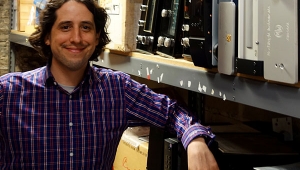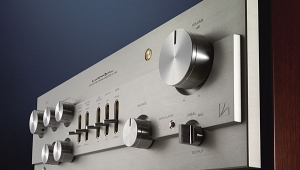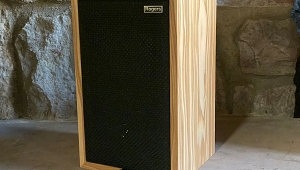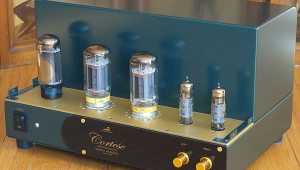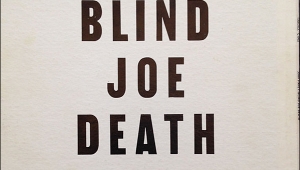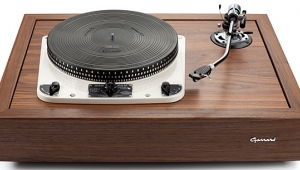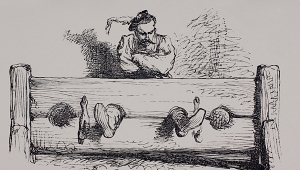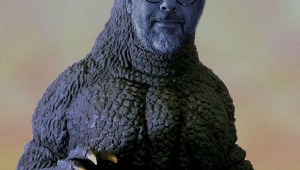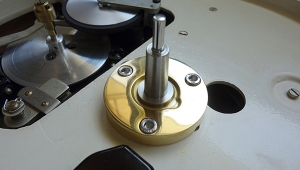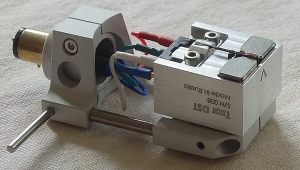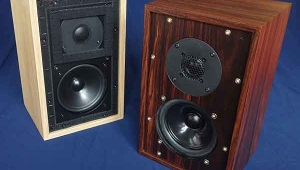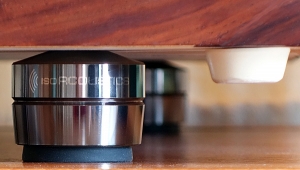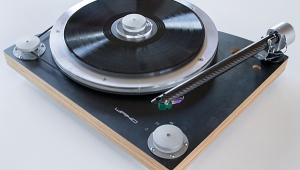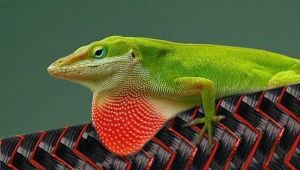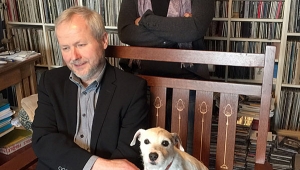| Columns Retired Columns & Blogs |
Listening #82 Page 2
I conferred with David Grier, and we set a date and a price. I wrote back to the people on the list, announcing an instructional workshop on Sunday, June 14, from 2 to 4pm, and a concert that evening, from 7pm to whenever. Admission for the workshop was $40, admission to the concert was $35, and admission to both could be had for the special price of $65. My family and I decided to foot the bill for free refreshments during both: After all, that's what we'd do with any party at our place. (A few folks offered to bring a dish to pass, God bless them.) I asked people to RSVP as early as possible, but decided against requiring payment in advance, or even a deposit.
Meanwhile, I looked around and decided that, by rolling up two carpets, moving a sofa and two huge upholstered chairs against one wall and the dining table against another, moving the Quads to the upstairs guest room, and borrowing some folding chairs from the local community center, I could create seating for an audience of up to 20 people, arranged in three tightly radiused rows, with David Grier in the seat of honor, facing them. And if my instincts were wrong...well, I supposed I wouldn't come out of it looking too pathetic, as long as I left that nice, big sofa right where it was, and maybe plumped up the pillows a bit.
But within one week, 14 people had written back to confirm their wish to attend the concert—12 of whom wanted to do the workshop, too. Two weeks after that, another 7 had signed up for the concert. I didn't realize until then just how nervous I'd been, but now our success seemed guaranteed.
Over the course of the next few days, a couple of folks bowed out—both graciously, both for reasonable reasons. It was cool.
On Wednesday, June 10, David Grier called from Nashville: He'd had an accident while cycling, and was on his way to the doctor's office to have some X-rays taken. David's spirits were fine, and he remained optimistic: He just thought I should know, in case any lingering discomfort compromised either his playing or the duration of the workshop. It was cool.
On Friday, June 12, David called me on his cell phone, from the shoulder of a highway in Ohio. The accident hadn't been that bad—his Prius appeared to be drivable, despite the fact that one of the rear doors could no longer be opened—and neither the people in the other car nor he had sustained any (new) injuries. You-know-who wept.
David arrived the next day, to many hugs and hellos and sighs of relief. A bottle of wine was opened, dinner reservations were made at a nice place in Cooperstown (I drove), and the day coasted to the finish line without further event.
On the morning of Sunday, June 14—the big day!—four more people canceled, all of whom had been slated to attend the workshop. What could I say? (One of them, to his credit, mailed me a check for the workshop fee anyway, made out to David: a classy thing to do.) On the other hand, two attendees called to say they were bringing more people to the concert. It seemed we would still take in slightly more than the guaranteed fee, and the workshop would actually be more manageable.
The weather was gorgeous that afternoon, and as, one by one, our workshop guests arrived, they were in high spirits: I have a pleasant memory of the astonishment on some of their faces as it sank in that the person greeting them at the door was in fact one of their musical heroes. Everyone brought their own guitars, of course, and David joked easily with the guests as they tuned up and he loosened up: He was still in pain from Wednesday's misadventure. The workshop was casual, ranging from a discussion of his ideas on improvisation—David believes in training oneself to find melodies on the fretboard spontaneously, as opposed to memorizing and playing set phrases and riffs—to demonstrations of a nice chord turnaround and some of his favorite G-runs (used in bluegrass as musical punctuation at the ends of certain lines). The attendees represented a fairly wide range of abilities, yet I daresay everyone left happy at the end of their two hours.
And now it was intermission time.
Best meeting
Our quarter-mile driveway, the bane of so many couriers in winter, was a saving grace on that hot June evening: I had mowed the verge of grass all along one side, making room for our concert attendees to park their cars in a single line. I mention this only because it led, in part, to one of the most remarkable things I've ever seen from my front door: An hour before the concert was scheduled to begin, my daughter called out with a note of apprehension in her voice: "Dad, what are all those people doing out there?" I looked out and saw roughly half of the audience, with folding chairs, coolers, and a satellite radio cranked up loud: a tailgate party in my front yard. That made me feel more like a real promoter than ever, and it was only the sternest rebuke from my wife that kept me from strolling through the gathering crowd, offering sample-size bottles of sunscreen at extortionate prices and warning people against the brown acid.
A few minutes before show time, they all filed in: mostly friends and acquaintances, with a few new faces sprinkled in. Everyone handed me their cash or a check made out to David without needing to be asked, then visited with one another over the snacks my wife and daughter had spent much of the afternoon preparing. At a little after 7pm, this audience of 15 serious music enthusiasts took their seats, and I introduced David Grier to generous applause.
Most of us were surprised when, about a half-hour into David's set, the skies outside darkened and a sudden rain morphed into one of the worst electrical storms we've experienced here. The power never went out, although it wouldn't have mattered if it had. David was nonplused, and although he had to pause in his performance once or twice—the thunder and lightning were that loud—he used the opportunities to tell some great jokes and to solicit requests, all of which he played, obligingly and brilliantly.
So then: What did real music sound like in the very space where I'm used to hearing just a pair of loudspeakers, well regarded though they may be?
Dynamic—much more dynamic—but in an easy way; not forced, in the manner of a loud noise on a record being played back with a megawatt amp. And the sound of a real musician had an altogether different—generally, a larger—kind of scale. But, again, the real thing wasn't comparable to anything I've heard in audio. The sound of a real musical instrument loaded our room differently from how that space is loaded by a pair of speakers, and the instrument's scale seemed tied to that, as did the above-mentioned dynamics: All those qualities seemed linked to one another, and simply emanated, together, from the performing space. Nothing in the world of hi-fi has ever sounded like that to me, although I have to say that the best mono systems I've heard have come closer in that regard than have the best stereos.
I love listening to my Quad ESLs, which are sufficiently open, transparent, and uncolored to suggest certain aspects of the real thing. In the same sense, I've seen one or two very good films about war that succeeded in suggesting aspects of the real thing—except that nobody got hurt. The experiences are completely different, and are meant to be approached and appreciated differently—and, as our female friends would surely put it, we ought to celebrate those differences. We should do so because, when we audiophiles pretend those differences don't exist, we sound like idiots.
Support the arts
The concert ended at a little before 9pm, and while David autographed CDs—he'd brought with him some copies of his brilliant new album, Evocative (Dreadnought 0901)—and chatted with the audience members, a few folks paused to ask me, "Who will perform here the next time?" The thought made me smile. I had a taste for doing this already.
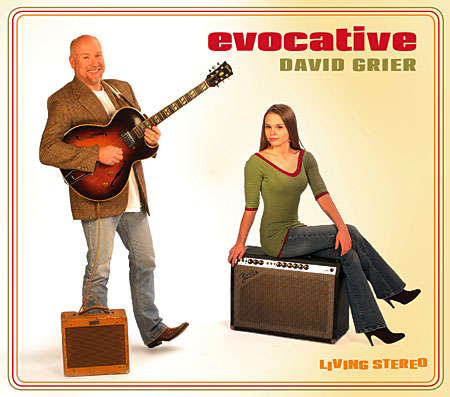
David Grier left our home a couple of days later, and played another couple of jobs in the northeast before heading to Maryland for a family reunion. Not long after that he got back to Nashville, had some new X-rays made, and discovered that both of his elbows had been broken. You wouldn't have known it from his playing that day: He was transcendent.
Later that week I looked around just a bit more, and came upon the thoroughly excellent website www.houseconcerts.us, run by Russell and Julie Paris of Oak Park, California. Russ and Julie have hosted house concerts regularly for over 12 years, featuring such performers as Jim Messina, Karla Bonoff, Chris Hillman, Herb Pedersen, John McEuen, and Laurence Juber. In other words, they've done this all before, a bazillion times—so I wrote to them and asked what advice they'd give a house-concert newbie. Here are Russ and Julie's top three tips:
"First, we suggest starting small. Host a single show and see how it goes. Then, if the first show goes well, think about a second house concert. We started with a single show, for a friend who is a singer-songwriter in our area. The success of that evening laid the foundation for our ongoing series.
"Second, keep the communications open. If the artist is expecting 50 people at $15 each and you only have 15, that's going to be a problem—so be sure to let the artist know how the RSVPs are shaping up. Let your audience know what to expect, too: Be sure they know that it's a house concert and not just a party with background music. And if you want to approach payment as a voluntary donation, try to explain to the people who are attending how essential it is that they make that donation. (We find that we get about 98% of our attendees donating the suggested amount, while some put in a little extra.)
"And third, as far as finding musicians is concerned, the best source online is Fran Snyder's www.concertsinyourhome.com, which has an extensive list of artists who are interested in performing at house concerts. Our own Resources page at www.houseconcerts.us also contains an extensive list of ongoing house-concert series. We also suggest starting by attending shows at local acoustic venues to learn about the artists in your community. Either way, it's important to find artists whose music excites you, as it's much easier to promote something that you are enthusiastic about. But bear in mind how an artist's show might fit into the living-room environment: Not all performers are comfortable in such intimate settings—some shows, especially larger bands, simply won't fit in a small, tight space—while, on the other hand, some artists thrive on the intimacy."
Russ and Julie's final tip is also a fine reminder for those of us who might otherwise forget audio reviewer Steve Guttenberg's insightful observation (I paraphrase): If the sound of a certain ensemble or instrument would overpower your room, then what makes you think a hi-fi playing the same music wouldn't do the same—if, that is, the two experiences really were comparable?
The answer, again, is that they aren't, and rather than resist the difference, we should bless it.
- Log in or register to post comments
